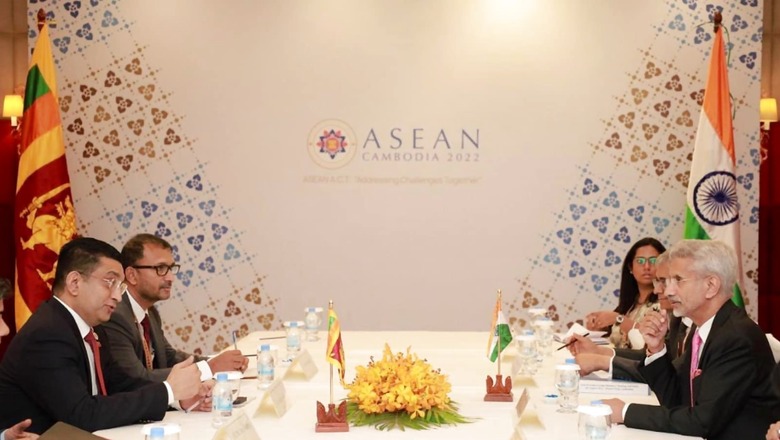
views
High tension was witnessed during ASEAN ministerial meeting in the Cambodian capital of Phnom Penh when Chinese government’s top diplomat Wang Yi walked out before the start of a gala dinner. This came amid strained relationship between China and Taiwan post US House Speaker Nancy Pelosi’s visit to Taipei. Yi was seen leaving in a vehicle from the venue where External Affairs Minister S Jaishankar met US Secretary of State Antony Blinken.
Wang Yi waved to media as he entered a holding room for the dinner then walked out of the venue, without giving a reason, according to Reuters journalists. Two witnesses working at the venue told the news agency that Wang Yi was seen leaving in a vehicle. The dinner was attended by more than a dozen foreign ministers, Blinken, Japan’s Yoshimasa Hayashi, and senior diplomats of the Association of Southeast Asian Nations (ASEAN).
Before the gala dinner, Jaishankar had said that India and the 10-nation grouping ASEAN have “strong convergence” on Indo-Pacific, combating the threat of terrorism and the developments in Ukraine and Myanmar. He further said that India and the Association of Southeast Asian Nations (ASEAN) also have similar views on connectivity projects, dealing with the Covid-19 pandemic and issues relating to cyber security.
The external affairs minister made the comments after attending an India-ASEAN ministerial meeting.
A warm conversation to start meetings on sidelines of ASEAN Ministerial in Phnom Penh.Discussed the ever strengthening India-US relationship and the global situation with US Secretary of State @SecBlinken. pic.twitter.com/JzcrBSklx4
— Dr. S. Jaishankar (@DrSJaishankar) August 4, 2022
In another tweet, Jaishankar said identified the digital domain, health, agriculture, education and green growth as the areas which drive the partnership between the two sides. “Digital, health, agriculture education and green growth will drive our partnership. Act East unfolds steadily,” he said.
Blinken said the US and India are strong proponents of the ASEAN centrality in the Indo-Pacific, according to the US State Department. “We are both strong proponents of ASEAN centrality. We have a shared vision together for a free and open Indo-Pacific that we work on in so many different ways every single day,” Blinken said.
“And of course, we have some immediate challenges that we’re both concerned with, to include the situation in Sri Lanka, Burma, and a number of other hot spots,” he said. “So I very much look forward to once again being able to go through a number of these issues with my friend, and then we’ll both head over to our meetings.”
A warm first meeting with FM Ali Sabry of Sri Lanka. Congratulated him on his new responsibility. Reaffirmed India’s commitment, as a dependable friend and reliable partner, to the economic recovery and well being of Sri Lanka.
Neighbourhood First. pic.twitter.com/qTCtmFm89h
— Dr. S. Jaishankar (@DrSJaishankar) August 4, 2022
Singaporean foreign minister Vivian Balakrishnan is the country coordinator for India in ASEAN. It is learnt that the India-ASEAN foreign ministers’ dialogue focused on overall developments in the Indo-Pacific region and ways to further expand ties against the backdrop of geopolitical developments, including the crisis in Ukraine.
The foreign ministers also discussed the situation in the South China Sea, a resource-rich region that has been witnessing increasing Chinese muscle-flexing. It is learnt that the meeting also underlined the need to follow the principles of the UN Convention for the Law of the Sea (UNCLOS) in the South China Sea region.
The ASEAN is considered one of the most influential groupings in the region. India and several other countries, including the US, China, Japan and Australia, are its dialogue partners. ASEAN-India dialogue relations started with the establishment of a sectoral partnership in 1992. This graduated to full dialogue partnership in December 1995 and summit level partnership in 2002.
The ties were elevated to a strategic partnership in 2012. The ASEAN is central to India’s Act East Policy and its vision for the wider Indo-Pacific. The ASEAN comprises Indonesia, Thailand, Vietnam, Laos, Brunei, the Philippines, Singapore, Cambodia, Malaysia and Myanmar. In June, India hosted the Special ASEAN-India foreign ministers’ meeting in New Delhi to mark the 30th anniversary of its relations with the grouping.
The developments in Sri Lanka and Myanmar figured prominently at the meeting in Phnom Penh. Last month, Sri Lanka witnessed massive political turmoil following mass protests that forced President Gotabaya Rajapaksa to flee the country. Veteran leader Ranil Wickremesinghe was sworn in as Sri Lanka’s new president amid hopes for recovery from economic distress.
The western powers were anguished over the execution of four pro-democracy activists by Myanmar’s military government last month.
Read the Latest News and Breaking News here




















Comments
0 comment